Related Research Articles

George Hamilton-Gordon,4th Earl of Aberdeen,styled Lord Haddo from 1791 to 1801,was a British statesman,diplomat and landowner,successively a Tory,Conservative and Peelite politician and specialist in foreign affairs. He served as Prime Minister from 1852 until 1855 in a coalition between the Whigs and Peelites,with Radical and Irish support. The Aberdeen ministry was filled with powerful and talented politicians,whom Aberdeen was largely unable to control and direct. Despite his trying to avoid this happening,it took Britain into the Crimean War,and fell when its conduct became unpopular,after which Aberdeen retired from politics.
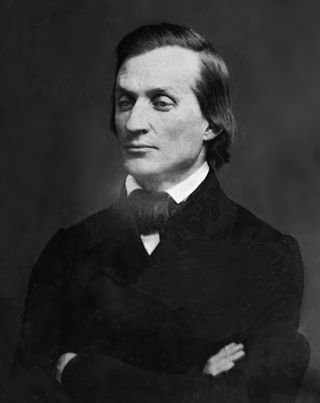
Solon Borland was an American politician,journalist,physician and military officer. He served as a United States Senator from Arkansas from 1848 to 1853. Later in life,he served as an officer of the Confederate States Army including commanded of a cavalry regiment in the Trans-Mississippi Theater of the American Civil War.

John Canfield Spencer was an American lawyer,politician,judge and United States Cabinet secretary in the administration of President John Tyler.
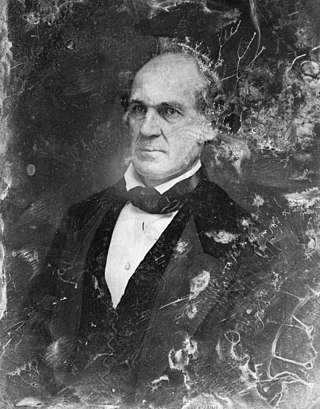
George Edmund Badger was an American politician who served as a Whig U.S. senator from the state of North Carolina.
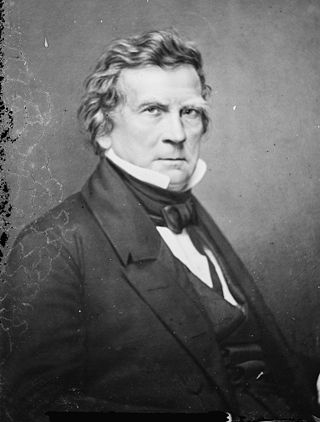
William Learned Marcy was an American lawyer,politician,and judge who served as U.S. Senator,Governor of New York,U.S. Secretary of War and U.S. Secretary of State. In the latter office,he negotiated the Gadsden Purchase,the last major acquisition of land in the contiguous United States.

John Bell was an American politician,attorney,and planter who was a candidate for President of the United States in the election of 1860.

Neill Smith Brown was an American politician and diplomat who served as the 12th Governor of Tennessee from 1847 to 1849,and as the United States Minister to Russia from 1850 to 1853. He also served several terms in the Tennessee House of Representatives,and was Speaker of the House for the 1855–1857 term. A lifelong Whig,Brown campaigned to keep Tennessee in the Union in the years leading up to the Civil War. However,once the war began,he sided with the Confederacy.

William Bowen Campbell was an American politician and soldier. He served as the 14th governor of Tennessee from 1851 to 1853,and was the state's last Whig governor. He also served four terms in the United States House of Representatives,from 1837 to 1843,and from 1866 to 1867.

The 33rd United States Congress was a meeting of the legislative branch of the United States federal government,consisting of the United States Senate and the United States House of Representatives. It met in Washington,D.C. from March 4,1853,to March 4,1855,during the first two years of Franklin Pierce's presidency. During this session,the Kansas–Nebraska Act was passed,an act that soon led to the creation of the Republican Party. The apportionment of seats in the House of Representatives was based on the 1850 United States census. Both chambers had a Democratic majority.
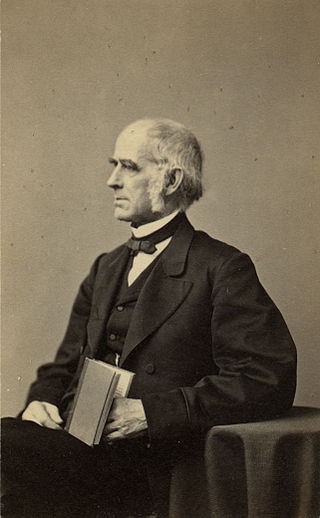
Emory Washburn was an American lawyer,politician,and historian. He was Governor of Massachusetts for one term,and served for many years on the faculty of Harvard Law School. His history of the early years of the Massachusetts Supreme Judicial Court is considered a foundational work on the subject.

William Hawkins Polk was an American politician and a member of the United States House of Representatives for Tennessee's 6th congressional district from 1851 to 1853. He was the younger brother of President James K. Polk. Prior to his election to Congress,he had been a member of the Tennessee House of Representatives (1841–1845),served as U.S. Minister to the Kingdom of the Two Sicilies (1845–1847),and fought as a major in the Mexican–American War.
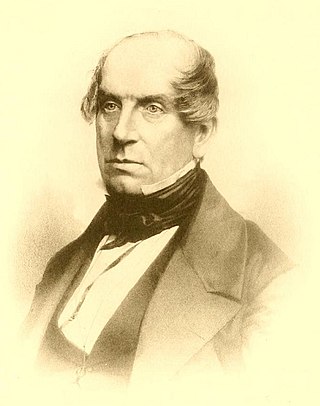
Ogden Hoffman was a 19th-century American lawyer and politician who for two terms was in the United States House of Representatives from 1837 to 1841.

Ben C. Eastman was an American lawyer,Democratic politician,and Wisconsin pioneer. He served two terms in the U.S. House of Representatives,representing Wisconsin's 2nd congressional district from 1851 to 1855. He previously served as secretary of the Council of the Wisconsin Territory during the 4th Wisconsin Territorial Assembly.

The 1855 United States Senate election in New York was held on February 6,1855,by the New York State Legislature to elect a U.S. Senator to represent the State of New York in the United States Senate.

The 1852–53 United States Senate elections were held on various dates in various states,coinciding with the 1852 presidential election. As these U.S. Senate elections were prior to the ratification of the Seventeenth Amendment in 1913,senators were chosen by state legislatures. Senators were elected over a wide range of time throughout 1852 and 1853,and a seat may have been filled months late or remained vacant due to legislative deadlock. In these elections,terms were up for the senators in Class 2.
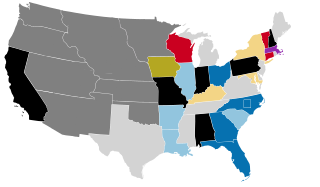
The 1854–55 United States Senate elections were held on various dates in various states. As these U.S. Senate elections were prior to the ratification of the Seventeenth Amendment in 1913,senators were chosen by state legislatures. Senators were elected over a wide range of time throughout 1854 and 1855,and a seat may have been filled months late or remained vacant due to legislative deadlock. In these elections,terms were up for the senators in Class 3.
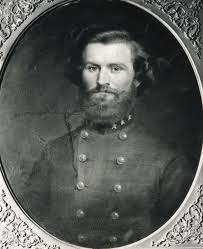
Randal William McGavock (1826–1863) was an American lawyer,Democratic politician,Southern planter,and colonel in the Confederate States Army. He served as the mayor of Nashville,Tennessee,from 1858 to 1859.
William H. Wisener was an American politician,active primarily at the state level in Tennessee during the mid-19th century. He served four terms in the Tennessee House of Representatives,including one term as Speaker (1853–1855). A Southern Unionist,he led the opposition to secession in the House on the eve of the Civil War. After the war,he served in the Tennessee Senate,where he introduced the 13th Amendment for ratification in April 1865.

Charles Linsley was a Vermont lawyer and politician. The son-in-law of Daniel Chipman,he was notable for his service as United States Attorney for the District of Vermont (1845-1849),member of the Vermont House of Representatives (1858-1859),and U.S. Collector of Customs for Vermont (1860-1861).
References
- 1 2 3 4 5 6 7 "Clipped From Sumter County Whig". Sumter County Whig. 1855-01-24. p. 2. Retrieved 2022-09-25.
- ↑ Halsey, Leroy J. (1841). Address to the Alumni Society of the University of Nashville on the study of theology ... with an appendix, containing a catalogue of the Alumni, and certain proceeding of the Society. p. 43.
- ↑ "Democratic State Ticket". Southern Standard. 1853-05-28. p. 2. Retrieved 2022-09-25.
- 1 2 3 Mississippi (1900). Department Reports. p. 179.
- 1 2 Rowland, Dunbar (1917). The Official and Statistical Register of the State of Mississippi. Department of Archives and History. p. 170.